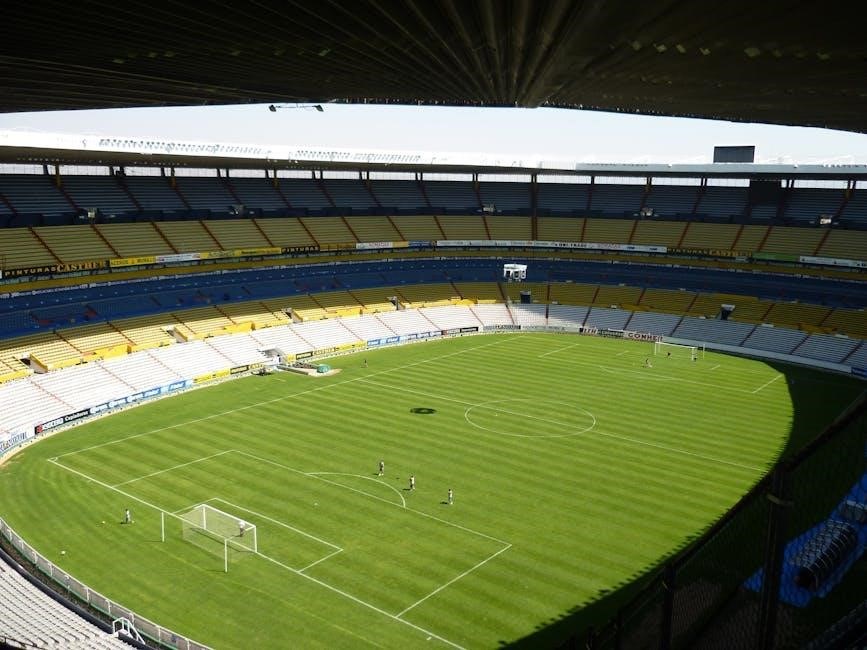The FIFA World Cup, founded by FIFA in 1930, is football’s most prestigious international tournament, showcasing national teams in a global spectacle that unites cultures and inspires millions worldwide․
1․1․ Overview of the FIFA World Cup
The FIFA World Cup is the most prestigious international football tournament, organized by FIFA since 1930․ Held every four years, it features national teams competing in a global spectacle, uniting cultures and inspiring millions․ The event has grown significantly, showcasing football’s cultural and social significance while maintaining its legacy as the ultimate test of national pride on the pitch․
1․2․ The First World Cup in 1930
Uruguay won the inaugural FIFA World Cup in 1930, defeating Argentina 4-2 in the final․ Held in Uruguay, it featured 13 teams from Europe and the Americas․ This historic tournament, organized by FIFA under Jules Rimet’s leadership, set the foundation for the World Cup as a global football phenomenon․
1․3․ Evolution of the Tournament
The FIFA World Cup has expanded from 13 teams in 1930 to 32, with plans for 48 in 2026․ Its global reach and participation have grown significantly, showcasing diverse football cultures and advancing through technological and media innovations that enhance fan engagement worldwide․
Key Historical Moments in the World Cup
The FIFA World Cup has witnessed iconic milestones, from Uruguay’s inaugural victory in 1930 to the impact of World War II halting the tournament, and the introduction of VAR technology․
2․1․ The Inception of the World Cup
The FIFA World Cup was born from Jules Rimet’s vision to create a global football championship․ The first tournament in 1930, hosted by Uruguay, featured 13 teams from Europe and the Americas, with Uruguay defeating Argentina 4-2 in the final, marking the beginning of a historic sporting legacy․
2․2․ The Role of Jules Rimet
Jules Rimet, FIFA’s president from 1921 to 1954, was instrumental in creating the World Cup․ His vision for a global football tournament led to the inaugural 1930 event in Uruguay․ The trophy was named after him, symbolizing his dedication to unifying nations through the beautiful game and leaving a lasting legacy․
2․3․ The First Championship and Its Impact
The 1930 FIFA World Cup, held in Uruguay, marked a historic milestone․ Uruguay’s 4-2 victory over Argentina crowned them the first champions, setting the stage for the tournament’s global success and cementing its legacy as the pinnacle of international football․
Legendary Players and Their Contributions
Pelé, Diego Maradona, and Miroslav Klose are icons who shaped World Cup history․ Their exceptional skills, record-breaking goals, and leadership inspired nations, leaving an indelible mark on football’s legacy․
3․1․ Pelé and Brazil’s Triumphant Era
Pelé, a three-time World Cup winner, led Brazil to victories in 1958, 1962, and 1970․ His extraordinary skill and charisma transformed football, cementing Brazil’s status as a football powerhouse․ His career from 1957 to 1971 and global ambassador role left an enduring legacy in the sport․
3․2․ Diego Maradona’s Influence
Diego Maradona, a legendary Argentine midfielder, captivated the world with his exceptional skill and leadership․ His pivotal role in Argentina’s 1986 World Cup victory, including the infamous “Hand of God” goal, showcased his brilliance․ Maradona’s creativity and passion inspired a generation, solidifying his status as one of football’s greatest icons․
3․3․ Miroslav Klose’s Record-Breaking Career
Miroslav Klose, a German striker, holds the record as the World Cup’s all-time leading scorer with 16 goals; His consistency across four tournaments showcased his ability to perform on the biggest stage, cementing his legacy as one of football’s most prolific players in international competition․

The Global Impact of the World Cup
The FIFA World Cup transcends sport, uniting nations and cultures globally․ Its influence extends beyond football, shaping identities, fostering unity, and driving economic and social change worldwide․
4․1․ Cultural and Social Significance
The FIFA World Cup holds profound cultural significance, uniting people across borders and fostering national pride․ It serves as a platform for cultural exchange, showcasing traditions and values through football․ The tournament transcends sport, becoming a symbol of global unity and shared identity․
Its social impact is equally profound, inspiring generations and breaking cultural barriers․ Legendary players like Pelé and Maradona have become cultural icons, embodying the spirit of their nations and the beautiful game․ The World Cup’s legacy continues to shape societies and inspire future generations․
4․2․ Economic Effects on Host Countries
Hosting the FIFA World Cup brings significant economic investments, creating jobs and boosting local infrastructure․ However, costs can strain public resources, leading to long-term debt and financial challenges for host nations․
The tournament often sparks tourism growth, enhancing a country’s global image․ Yet, the financial burden of building stadiums and upgrading facilities can outweigh immediate economic gains, impacting future development․
4․3․ Unifying Power Across Nations
The FIFA World Cup transcends borders, uniting people globally through shared excitement and pride in national teams․ It fosters a sense of community, bridging cultural gaps and creating unforgettable memories worldwide․
The tournament’s universal appeal highlights football’s power to connect diverse populations, inspiring unity and camaraderie among fans across continents․

Curiosities and Anecdotes
The FIFA World Cup is filled with fascinating anecdotes, such as the first tournament in 1930 having only 13 teams and the record for the fastest goal in World Cup history․
5․1․ Interesting Facts About Past Tournaments
The 1930 World Cup featured only 13 teams, with Uruguay winning the inaugural title․ The 1966 tournament holds the record for the most goals scored, showcasing the evolution of football’s global appeal and competitive spirit over the years․
5․2․ Unique Traditions and Superstitions
The FIFA World Cup is rich in unique traditions, from vibrant opening ceremonies to passionate fan chants․ Players often have personal superstitions, such as pre-game rituals or lucky charms, adding a fascinating cultural layer to the tournament’s history and appeal․
5․3․ Surprising Victories and Upsets
The FIFA World Cup has witnessed stunning upsets, such as Uruguay’s 1950 victory over Brazil in the Maracanazo and Senegal’s 2002 defeat of France․ These unexpected wins highlight the tournament’s unpredictability and showcase the competitive spirit of underdog teams, leaving lasting memories in football history․

The Role of African and Asian Teams
African and Asian teams have increasingly impacted the World Cup, with memorable performances from nations like Senegal and South Korea, showcasing their growing influence on global football․
6․1․ Breakthroughs in African Football
African teams have made significant strides, with Senegal reaching the 2002 World Cup quarterfinals and Cameroon inspiring in 1990․ These moments showcased Africa’s growing talent and passion, influencing future generations and elevating the continent’s football legacy on the global stage․
6․2․ The Rise of Asian Teams
Asian nations have progressively made their mark, with South Korea reaching the 2002 World Cup semifinals and Japan consistently qualifying since 1998․ These milestones highlight the growing talent and dedication, inspiring future generations and solidifying Asia’s presence in global football․
6․3․ Notable Players from Africa and Asia
Legendary figures like Samuel Eto’o and Didier Drogba from Africa, and Hidetoshi Nakata from Asia, have left indelible marks on the World Cup․ Their exceptional skills and leadership elevated their teams, inspiring millions and paving the way for future generations in their respective continents․
Technological Advancements in the World Cup
The World Cup has embraced technological evolution, from radio broadcasts to modern streaming, enhancing global accessibility and fan engagement while maintaining its core essence as a unifying event․
7․1․ From Radio to Modern Broadcasting
The FIFA World Cup’s broadcast evolution transformed from radio coverage in the 1930s to high-definition streaming today․ This technological shift enabled billions worldwide to experience the tournament, fostering global unity and unparalleled fan engagement through immersive, real-time access to matches and behind-the-scenes content․
The 2018 FIFA World Cup marked the debut of Video Assistant Referee (VAR) technology, enhancing refereeing accuracy; VAR reviews key decisions like goals, penalties, and red cards, using video footage to ensure fairness․ While it improves decision-making, its implementation has sparked debate over its impact on the game’s flow and traditional refereeing practices․
7․3․ Future Innovations in the Tournament
Future FIFA World Cups aim to integrate advanced technologies like AI-driven analytics, virtual reality experiences, and sustainable energy solutions․ Innovations such as robotic assistants, enhanced player tracking, and 5G connectivity will further enhance the fan experience and operational efficiency, ensuring the tournament remains a global benchmark for sports innovation and inclusivity;
Notable Coaches and Their Strategies
Legendary coaches like Jules Rimet and Vicente del Bosque left indelible marks on the World Cup with innovative tactics and leadership, shaping the tournament’s history and inspiring future generations․
8․1․ Legendary Coaches and Their Impact
Legendary coaches like Jules Rimet and Vicente del Bosque have profoundly influenced the FIFA World Cup․ Their innovative strategies, leadership, and ability to inspire players have shaped the tournament’s history, leaving a lasting legacy in international football and cementing their status as icons in the sport․
8․2․ Tactical Innovations Over the Years
Tactical innovations have transformed FIFA World Cup strategies, evolving from traditional formations to modern, dynamic systems․ The introduction of pressing tactics, high-intensity training, and advanced positional play has elevated team performance․ Technological advancements, like VAR, have also influenced gameplay, ensuring accuracy and fairness in decision-making․
8․3․ Coaching Philosophies
Coaching philosophies in the FIFA World Cup have evolved significantly, reflecting changing strategies and player dynamics․ From Jules Rimet’s foundational approaches to modern tactics, coaches have adapted to the game’s demands, emphasizing teamwork, adaptability, and innovation․ These philosophies continue to shape the tournament, inspiring future generations of leaders in football․
Milestones and Records
Miroslav Klose holds the record for most World Cup goals with 16, while Brazil leads with five tournament wins․ These milestones highlight the event’s competitive excellence and global impact․
9․1․ Most Successful Teams
Brazil leads with five World Cup titles, followed by Germany and Italy with four each․ Argentina and Uruguay have also made history, with Uruguay winning the inaugural tournament in 1930․ These teams have set benchmarks, showcasing their consistent excellence and leaving a lasting legacy in football history․
9․2․ Highest Goal Scorers
Miroslav Klose holds the record with 16 World Cup goals, showcasing remarkable consistency over four tournaments․ Legends like Pelé, Diego Maradona, and Ronaldo also left indelible marks, inspiring future generations with their extraordinary talent and dedication to the beautiful game․
9․3․ Longest Matches and Other Records
The 1930 World Cup saw the longest match, lasting over 120 minutes․ Other records include Brazil’s 17 consecutive wins and Hungary’s 8-3 victory in 1954․ These milestones highlight the tournament’s competitive spirit and the enduring legacy of football’s greatest stage․

Legacy of the World Cup
The FIFA World Cup’s legacy is profound, shaping football history, inspiring generations, and fostering global unity through its iconic moments and unforgettable achievements․
10․1․ Historical Significance
The FIFA World Cup, established in 1930 by FIFA, holds immense historical significance as the world’s premier international football tournament․ Founded by Jules Rimet, it debuted in Uruguay, showcasing national teams and uniting global audiences․ The tournament paused during World War II but resumed in 1950, cementing its legacy as a symbol of unity and sporting excellence․
10․2․ Inspiring Future Generations
The FIFA World Cup has long served as a source of inspiration for young players and fans worldwide․ Its rich history, iconic moments, and legendary figures like Pelé and Maradona motivate aspiring athletes․ The tournament’s global reach and cultural impact continue to foster passion for football, shaping the next generation of players and supporters․
10․3․ The World Cup’s Enduring Appeal
The FIFA World Cup’s enduring appeal lies in its ability to unite cultures, spark emotions, and create unforgettable moments․ Its rich history and global reach ensure it remains a pinnacle of sport, captivating audiences and inspiring future generations with its unique blend of tradition and modern spectacle․
Recent Developments
The FIFA World Cup continues to evolve, with expansions to 48 teams, innovative hosting formats, and increased focus on sustainability and technological advancements to enhance the tournament’s global appeal․
11․1․ Expansion to 48 Teams
The FIFA World Cup will expand to 48 teams starting from the 2026 edition, increasing global participation and providing more nations with the opportunity to compete․ This change aims to enhance diversity and inclusivity while maintaining the tournament’s competitive integrity and excitement for fans worldwide․
11․2․ Hosting in Multiple Countries
The FIFA World Cup has evolved to include co-hosting by multiple countries, starting with Japan and South Korea in 2002․ This format allows shared resources and broader global engagement, while maintaining the tournament’s prestige and appeal․ Future editions, like the 2026 tournament in the United States, Canada, and Mexico, will continue this trend․
11․3․ Sustainability and Social Responsibility
Modern FIFA World Cups emphasize sustainability and social responsibility, incorporating eco-friendly practices and human rights initiatives․ Recent tournaments have focused on reducing environmental impact through energy-efficient stadiums and recycling programs, while also promoting social inclusion and community engagement, ensuring a lasting positive legacy beyond the football pitch․
The FIFA World Cup’s rich history and global impact ensure its enduring legacy, inspiring future generations while embracing innovation and growth in the beautiful game․
12․1․ Reflecting on Past Achievements
The FIFA World Cup has celebrated iconic moments, from Uruguay’s inaugural triumph in 1930 to Brazil’s dominance and Pelé’s brilliance․ Records like Miroslav Klose’s 16 goals and historic finals continue to inspire, marking the tournament’s legacy as a pinnacle of football excellence and global unity․
12․2․ Anticipation for Future Tournaments
Future FIFA World Cups promise excitement with the 48-team expansion, innovative technologies, and sustainable practices․ Hosting across multiple countries and advancing VAR systems aim to enhance fan experiences while maintaining the tournament’s global appeal and competitive spirit․
12․3․ The Ever-Changing Landscape of the World Cup
The FIFA World Cup continues to evolve, embracing technological advancements, expanded team participation, and sustainability initiatives․ These changes aim to enhance inclusivity and fan engagement while preserving the tournament’s legacy as a global sporting phenomenon that captivates audiences and unites nations through football․
